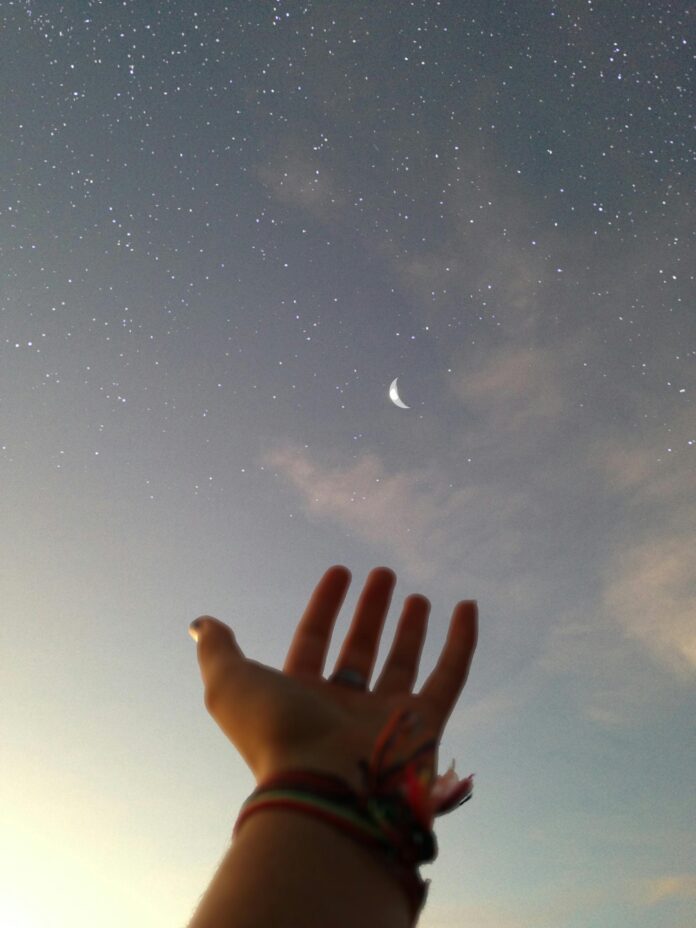Some of the most highly-anticipated events in Islam are centred on astronomy. The sighting of the moon commences Ramadan, the Salat al-Kusuf is adhered to upon the solar eclipse, and the lunar calendar itself is used to mark the beginning of each month. The framework of Muslim society is built upon the moon… so why is it that we only choose to look up when we’re waiting for something?
The moon itself is a sign of Allah’s mercy and strength. Desert-dwellers depended upon its light to navigate ancient terrain. Sighting the moon for special events puts the will of the calendar in Allah’s control, not of those in power who may wish to change and anoint days at their own will. According to the Hijri calendar, itself lunar, we are in the 1440s, more than 1400 years since Muhammad (saw)’s migration from Mecca to Medina in 622 CE.
The observation of the moon is mentioned in the Quran many times, both as a point of guidance for Muslims to follow and a reference to the miracles of Islam. Surah Al-Baqarah confirms that Muslims are to use the moon to fix set times in place:
۞ يَسْـَٔلُونَكَ عَنِ ٱلْأَهِلَّةِ ۖ قُلْ هِىَ مَوَٰقِيتُ لِلنَّاسِ وَٱلْحَجِّ ۗ وَلَيْسَ ٱلْبِرُّ بِأَن تَأْتُوا۟ ٱلْبُيُوتَ مِن ظُهُورِهَا وَلَـٰكِنَّ ٱلْبِرَّ مَنِ ٱتَّقَىٰ ۗ وَأْتُوا۟ ٱلْبُيُوتَ مِنْ أَبْوَٰبِهَا ۚ وَٱتَّقُوا۟ ٱللَّهَ لَعَلَّكُمْ تُفْلِحُونَ
People question you concerning the phases of the moon. Say: “They are signs to determine time for the sake of people and for the Pilgrimage.” Also tell them: “True righteousness is not that you enter your houses from the back; righteousness lies in fearing Allah. So, enter your houses by their doors, and fear Allah that you might attain true success.”
(Surah Al-Baqarah, 189)
An entire Surah, or chapter, of the Quran is titled Al-Qamar: The Moon. The chapter focuses on the miracle of the moon splitting in two, as a sign from Muhammad (saw) to the disbelievers. Still, the disbelievers denounced what they saw.
ٱقْتَرَبَتِ ٱلسَّاعَةُ وَٱنشَقَّ ٱلْقَمَرُ
The Hour has drawn near and the moon was split ˹in two˺.1
(Surah Al-Qamar, 1)
The idea that people may still be blind despite viewing a miracle above them, in front of their eyes, may seem ridiculous. But is the rise and descent of natural matters not in and of itself a miracle? In a world increasingly dependent on technology and artificial light, we’ve lost the deep connection that the salaf (the pious predecessors) had with the sky above. They relied on celestial bodies not only for practical matters, like navigation and timekeeping but also as a constant reminder of the divine.
Today, we live in cities where the stars are often drowned out by light pollution, and our focus is rarely on the heavens. This distance from nature can sometimes make us forget the signs Allah placed above us. But those signs never cease to exist. Each phase of the moon, each shift in the tides, continues to follow the patterns that Allah has ordained, whether we look up to notice or not.
وَهُوَ ٱلَّذِى خَلَقَ ٱلَّيْلَ وَٱلنَّهَارَ وَٱلشَّمْسَ وَٱلْقَمَرَ ۖ كُلٌّۭ فِى فَلَكٍۢ يَسْبَحُونَ
And He is the One Who created the day and the night, the sun and the moon—each travelling in an orbit.
(Surah Al-Anbya, 33)
Just as the moon guides the Islamic calendar and important acts of worship, it also serves as a broader symbol of submission to the Divine will. Just as the moon follows its natural course, so too should Muslims aim to follow the path set out for them in Islam—one that is defined by our relationship to the environment and sustainability. Whether observing a solar eclipse, beginning Ramadan, or simply watching the moon rise, there is a reminder to realign with the natural rhythms that Allah has set.
The importance of observing and appreciating the natural world is a recurring theme in the Quran. In Surah Fussilat, Allah invites humans to reflect on the universe around them:
سَنُرِيهِمْ ءَايَـٰتِنَا فِى ٱلْـَٔافَاقِ وَفِىٓ أَنفُسِهِمْ حَتَّىٰ يَتَبَيَّنَ لَهُمْ أَنَّهُ ٱلْحَقُّ ۗ أَوَلَمْ يَكْفِ بِرَبِّكَ أَنَّهُۥ عَلَىٰ كُلِّ شَىْءٍۢ شَهِيدٌ
We will show them Our signs in the universe and within themselves until it becomes clear to them that this ˹Quran˺ is the truth. Is it not enough that your Lord is a Witness over all things?
(Surah Fussilat, 53)
This verse reminds us that Allah’s signs are present both in the vastness of the universe and within our very selves. It is up to Muslims, as Khalifahs, or stewards, of the earth, to recognize these signs, to look up when the moon rises, and to feel gratitude for the order that governs both the heavens and the earth. The observation of the natural world can be a pathway to deeper faith.
In the end, it’s not just about sighting the moon for religious observance—it’s about cultivating a sense of awe and awareness for Allah’s creation that permeates all aspects of our lives.
Read More: The Quran, Sunnah, and the Path to Climate Justice



